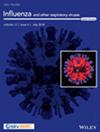Associations Between Severe Influenza-Complicated Thromboembolism Events, Intensive Care Unit Stays and Mortality, and Associated Risk Factors: A Retrospective Cohort Study
Abstract
The association between influenza infection and thromboembolism (TE) events, including cardiovascular events, cerebrovascular events, pulmonary embolism, and deep vein thrombosis, is supported by compelling evidence. However, there is a disparity in the risk factors that impact the outcomes of severe influenza-complicated TE in intensive care unit (ICU) patients. The objective of this study was to evaluate the outcomes of severe influenza-complicated TE in ICU patients and identify any associated risk factors.
Methods
A retrospective cohort study was conducted, recruiting consecutive patients with TE events admitted to the ICU between December 2015 through December 2018 at our institution in Taiwan. The study included a group of 108 patients with severe influenza and a control group of 192 patients with severe community-acquired pneumonia. Associations between complicated TE, length of ICU stay, and 90-day mortality were evaluated using logistic regression analysis, and risk factors were identified using univariate and multivariate generalized linear regression analyses.
Results
TE event prevalence was significantly higher in ICU patients with severe influenza than in ICU patients with severe CAP (21.3% vs. 5.7%, respectively; p < 0.05). Patients with severe influenza who developed TE experienced a significant increase in the ratio of mechanical ventilation use, length of mechanical ventilation use, ICU stay, and 90-day mortality when compared to patients without TE (all p < 0.05). The comparison of severe CAP patients with and without TE revealed no significant differences (p > 0.05). The development of thromboembolic events in patients with severe influenza or severe noninfluenza CAP is linked to influenza infection and hypertension (p < 0.05). Furthermore, complicated TE and the severity of the APACHE II score are risk factors for 90-day mortality in ICU patients with severe influenza (p < 0.05).
Conclusions
Patients with severe influenza and complicated TE are more likely to have an extended ICU stay and 90-day mortality than patients with severe CAP. The risk is significantly higher for patients with a higher APACHE II score. The results of this study may aid in defining better strategies for early recognition and prevention of severe influenza-complicated TE.


 求助内容:
求助内容: 应助结果提醒方式:
应助结果提醒方式:


